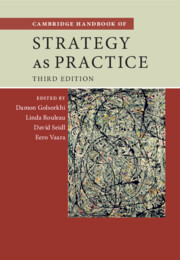Book contents
- Cambridge Handbook of Strategy as Practice
- Cambridge Handbook of Strategy as Practice
- Copyright page
- Contents
- Figures
- Tables
- Boxes
- Contributors
- Preface to the Third Edition
- Introduction: What Is Strategy as Practice?
- Part I Ontological and Epistemological Questions
- Part II Theoretical Resources: Social Theory
- Chapter 6 Structuration Theory: Giddens and Beyond
- Chapter 7 An Activity Theory Approach to Strategy as Practice
- Chapter 8 A Bourdieusian Perspective on Strategizing
- Chapter 9 A Wittgensteinian Perspective on Strategizing
- Chapter 10 A Foucauldian Perspective on Strategic Practice: Strategy as the Art of (Un)folding
- Chapter 11 A Narrativity Approach to Strategy as Practice: Strategy-Making from Texts and Narratives
- Chapter 12 Actor–Network Theory and Strategy as Practice
- Chapter 13 A Dramaturgical Framework for Strategy as Practice
- Chapter 14 Schatzki’s Practice Theory and Strategy as Practice
- Chapter 15 An Economies-of-Worth Perspective on Strategy as Practice: Dealing with Strategic Pluralism through Legitimation, Localization and Materialization
- Chapter 16 Strategy as a Performative Practice: A Self-Referential, Knowledge-Based Perspective
- Part III Theoretical Resources: Organization and Management Theories
- Part IV Methodological Resources
- Part V Substantive Topic Areas
- Index
- References
Chapter 15 - An Economies-of-Worth Perspective on Strategy as Practice: Dealing with Strategic Pluralism through Legitimation, Localization and Materialization
from Part II - Theoretical Resources: Social Theory
Published online by Cambridge University Press: 11 March 2025
- Cambridge Handbook of Strategy as Practice
- Cambridge Handbook of Strategy as Practice
- Copyright page
- Contents
- Figures
- Tables
- Boxes
- Contributors
- Preface to the Third Edition
- Introduction: What Is Strategy as Practice?
- Part I Ontological and Epistemological Questions
- Part II Theoretical Resources: Social Theory
- Chapter 6 Structuration Theory: Giddens and Beyond
- Chapter 7 An Activity Theory Approach to Strategy as Practice
- Chapter 8 A Bourdieusian Perspective on Strategizing
- Chapter 9 A Wittgensteinian Perspective on Strategizing
- Chapter 10 A Foucauldian Perspective on Strategic Practice: Strategy as the Art of (Un)folding
- Chapter 11 A Narrativity Approach to Strategy as Practice: Strategy-Making from Texts and Narratives
- Chapter 12 Actor–Network Theory and Strategy as Practice
- Chapter 13 A Dramaturgical Framework for Strategy as Practice
- Chapter 14 Schatzki’s Practice Theory and Strategy as Practice
- Chapter 15 An Economies-of-Worth Perspective on Strategy as Practice: Dealing with Strategic Pluralism through Legitimation, Localization and Materialization
- Chapter 16 Strategy as a Performative Practice: A Self-Referential, Knowledge-Based Perspective
- Part III Theoretical Resources: Organization and Management Theories
- Part IV Methodological Resources
- Part V Substantive Topic Areas
- Index
- References
Summary
Jean-Pascal Gond, Bernard Leca, Charlotte Cloutier and Alfredo Grattarola in turn introduce the ‘Economies of Worth’ (EW) perspective to strategy as practice scholars, emphasizing its critical distance from earlier forms of critical sociology and its distinctiveness from the concept of institutional logic. They clarify the EW assumptions, introduce its key concepts, and explain its usefulness for understanding the formation of social agreement in the context of disputes. Based on a review of existing EW studies, they discuss how the framework has thus far been used to analyze how actors deal with strategic pluralism and, more specifically, to investigate the social dynamics underlying strategic legitimation, strategic localization and strategic materialization. They conclude by explaining how certain key insights from economies of worth can be further leveraged to continue to advance strategy as practice research at the phenomenological, conceptual and methodological levels.
Keywords
- Type
- Chapter
- Information
- Cambridge Handbook of Strategy as Practice , pp. 267 - 289Publisher: Cambridge University PressPrint publication year: 2025

